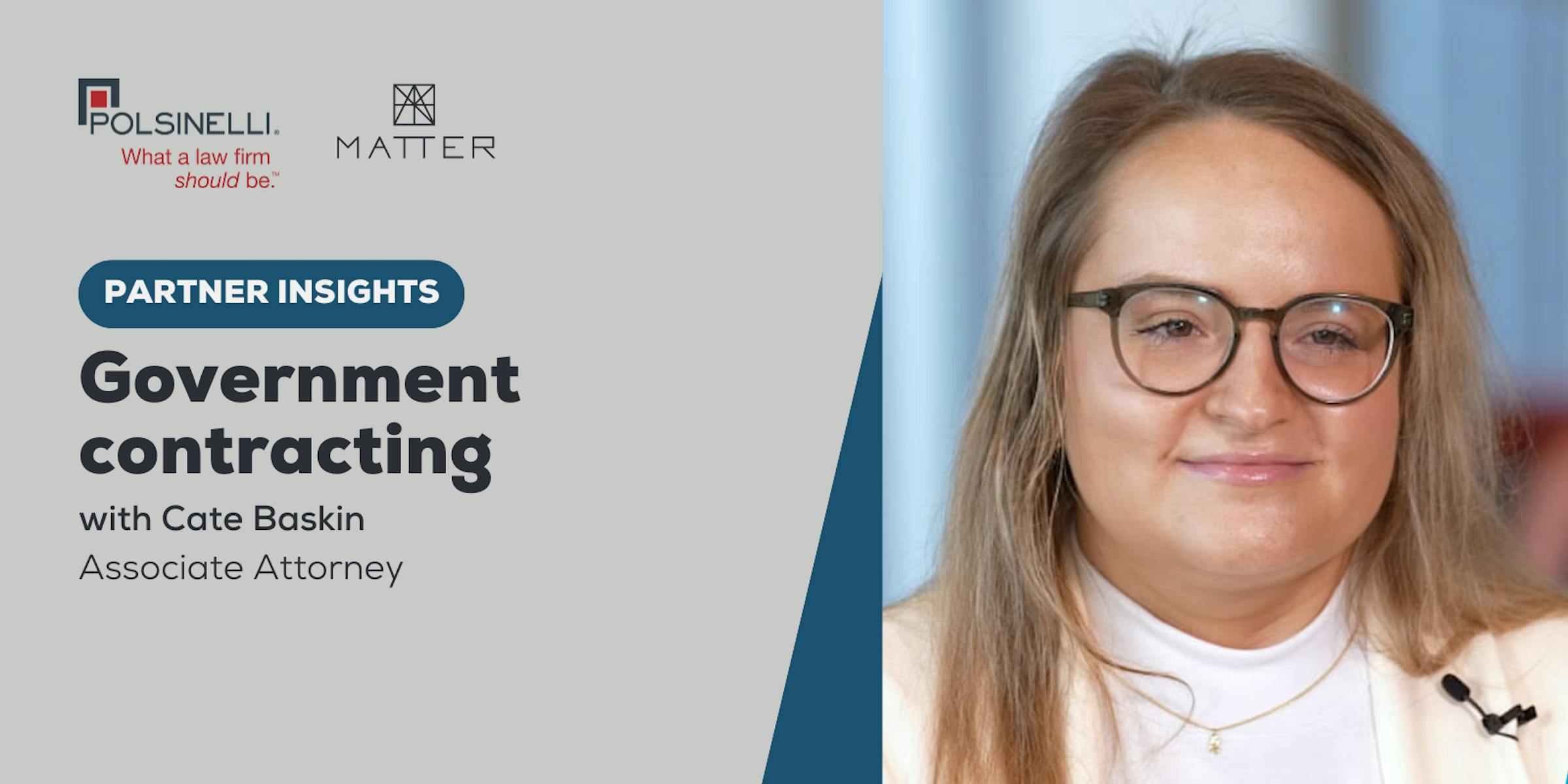Partner Insights: Government contracting with Polsinelli’s Cate Baskin
For healthcare startups, the regulatory landscape can seem daunting. The field is layered with complex rules across federal, state and local levels, each adding a layer of compliance challenges and, importantly, potential opportunities. With insights from Cate Baskin, an associate attorney at Polsinelli, here’s a guide to help healthcare startups navigate the regulatory environment and unlock the possibilities of working with the government.
Watch the full video below or read on for key insights.
The Regulatory Landscape: More Than Just a Checklist
Healthcare regulations are a mix of familiar standards like HIPAA and the ACA, alongside specialized rules for government contracts, such as the Federal Acquisition Regulation. At the state level, licensure, Medicaid regulations and telehealth standards vary widely, adding another layer of regulatory complexity. Locally, zoning laws and even county-specific hazardous material rules can impact how and where a startup operates. Understanding these distinct levels of regulation allows startups to stay compliant and mitigate risk while setting the stage for innovation within the confines of regulatory requirements.
Building a Compliance Foundation: Key Themes for Healthcare Startups
Baskin highlights three essential pillars of regulatory compliance: disclosure, training and mitigation. Each plays a crucial role in creating a robust compliance program:
- Disclosure: Transparency is vital. Startups should document all policies and procedures clearly and make these accessible to employees. Additionally, establishing reporting channels for compliance concerns ensures accountability at every level of the organization.
- Training: Regular training is essential, enabling employees to understand and adhere to policies and procedures. As regulations evolve, so should training programs — typically on an annual basis.
- Mitigation: No organization is immune to potential regulatory issues. Preemptively integrating mitigation strategies — such as data security protocols for handling sensitive health information — helps startups remain prepared for potential risks, particularly those that can affect cybersecurity.
Preparing for Government Contracts: From Registration to Relationship Building
Government contracting offers a unique growth avenue, often leading to reliable revenue streams, expanded market reach and added credibility. However, government contracts differ significantly from commercial contracts, both in scope and in terms of disclosure and compliance requirements.
- Register and Certify: Startups must register with the System for Award Management (SAM.gov), the essential platform for government business procurement. Additionally, securing certifications (e.g., as a small, minority-owned, veteran-owned or woman-owned business) through the U.S. Small Business Administration can enhance eligibility for certain contracts and help position startups competitively within the contracting landscape.
- Build Industry Connections: Networking within industry associations — like the Healthcare Information and Management Systems Society or the American Medical Association — can be invaluable. Beyond networking, these affiliations provide insights into regulatory shifts, ensuring that startups remain informed and agile in response to regulatory changes.
Navigating Conflicts of Interest: A Critical Area for Compliance
In government contracting, managing conflicts of interest is particularly critical. Government contracts demand a level of disclosure that surpasses typical commercial engagements, so it’s essential to understand and mitigate potential conflicts at both personal and organizational levels.
- Personal Conflicts of Interest: This encompasses common conflicts, such as financial or familial interests, that may inadvertently interfere with business decisions.
- Organizational Conflicts of Interest (OCI): OCI can be more challenging to identify and, if left unaddressed, may erode public trust in the procurement process. For example, startups with access to non-public information related to a contract must handle this data responsibly to avoid unfair competitive advantages.
Flexibility and Agility: A Dual Approach to Long-Term Success
As Baskin underscores, successful government contracting requires a delicate balance: startups must stay true to their core values and mission while remaining flexible enough to adapt to evolving regulations. This agility allows healthcare startups to address new regulatory challenges proactively and seize emerging opportunities in the government contracting space.
The Bottom Line: For healthcare startups, government contracting is more than just an opportunity—it’s a gateway to growth and impact. With the right approach to compliance, regulatory awareness and relationship-building, startups can navigate this complex landscape successfully, turning regulatory challenges into a springboard for innovation and growth.
About MATTER
At MATTER, we believe collaboration is the best way to improve healthcare. The MATTER collaborative includes more than 1,000 current and alumni startups from around the world, working together with dozens of hospitals and health systems, universities and industry-leading companies to build the future of healthcare. Together we are accelerating innovation, advancing care and improving lives. For more information, visit matter.health and follow @MATTERhealth.
About Polsinelli
Polsinelli is an Am Law 100 firm with more than 1,000 attorneys in over 20 offices nationwide. Recognized as one of the top firms for excellent client service and client relationships, Polsinelli is committed to meeting our clients’ expectations of what a law firm should be. Our attorneys provide value through practical legal counsel infused with business insight, offering comprehensive corporate, transactional, litigation and regulatory services with a focus on health care, real estate, finance, technology, private equity and life sciences. Polsinelli PC, Polsinelli LLP in California, Polsinelli PC (Inc) in Florida.



